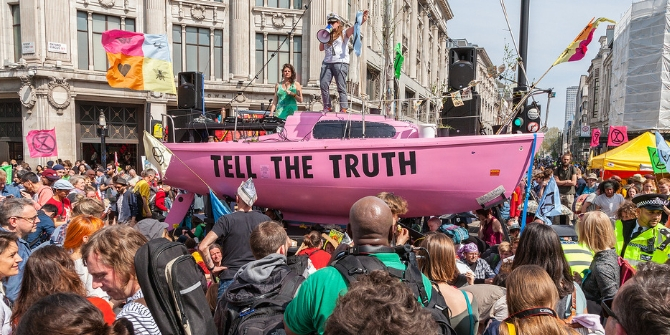Reflecting on how they brought about “Swiftposium” (an academic conference focused on all things Taylor Swift) Hannah McCann, Eloise Faichney, Rebecca Trelease and Emma Whatman consider the value of academic perspectives on popular culture and its power as a medium to bring research and society closer together.
The Swiftposium was a hybrid academic conference on the topic of singer-songwriter Taylor Swift. It was hosted by the University of Melbourne, days before Swift was set to perform in Melbourne, Australia. The idea came from a casual conversation when tickets for Taylor Swift’s Eras tour were released for sale in Australia and our desire to offer academic analysis surrounding her stardom, celebrity and unique social influence.
Our call for papers went viral (such is the interest in all things Swift) and was picked up by outlets including BBC News and Rolling Stone. We were overwhelmed. What we imagined would be a small symposium ended up with over 400 submitted abstracts. We accepted around 130 presenters, from 20 countries around the world, though we prioritized submissions from Asia-Pacific scholars given our location.
Our call for papers was deliberately wide. Though many of us on the steering committee come from culture and media studies, we were conscious of keeping open the possibility of diverse interdisciplinary engagements with Swift. In the end we had panels across a huge range of topic areas, including: literary studies, psychology, gender studies, medicine, philosophy, screen studies, education, musicology, political science, economics, urban planning, critical race studies, art history, publishing, and law.
What started as a friendly conversation ended with delegates and keynotes contributing extensively to the media discourse about Swiftmania
With support from Curtin University and Auckland University of Technology we secured funding for a two-day international hybrid conference the Swiftposium hosted by the University of Melbourne, and a pre-conference day for fans called the Fanposium hosted by RMIT University. We also received support to run a public facing panel hosted by Fed Square in Melbourne’s CBD. The conference was a success. What started as a friendly conversation ended with delegates and keynotes contributing extensively to the media discourse about Swiftmania.
What is Taylor Swift to the Academy?
Despite this success, in the run up to and after the Swiftposium, we encountered criticism about the value of holding such a conference. Some assumed Swiftposium was simply a fan convention with no critical perspectives on Swift. For others, popular culture and specifically Swift is not serious enough for academic attention. Might it even be embarrassing for our Universities to be associated with the pop star?
For cultural studies researchers, the debate over why popular culture is worth attending to is old and tired. We are surprised to find that we still have to defend this space. Popular culture operates in a dynamic relationship with people’s ideologies, values, and emotional lives. Popular culture influences but also reflects the zeitgeist of the times. Why should we think that academia has nothing to say, or ought to have nothing to say, about major moments in popular culture, when these moments both shape and are shaped by contemporary society?
Swift has for example, historically encouraged 35,000 young people to sign up to vote for the first time, has added $5.7 billion to the US economy with the Era’s tour, and is the most streamed artist in many countries
What we learned through the Swiftposium is that when you gather academics across a variety of fields to examine a popular culture phenomenon, you are not simply engaging with the question of popular culture and its impact. Swift has for example, historically encouraged 35,000 young people to sign up to vote for the first time, has added $5.7 billion to the US economy with the Era’s tour, and is the most streamed artist in many countries including Australia. On these topics political scientists, economists, and musicologists have much to say. However, other unexpected things also came up from this interdisciplinary space, such as how we can read Swift’s work in relation to gothic novels and autobiographical poetry, the limits of Swift’s feminist activism and her impact on #MeToo debates, critical interrogations of the themes of coloniality and whiteness in her work and even how her songs might be used to promote heart health for first aid practitioners.
Creating connections in and outside the university
Alongside these scholarly contributions we were also struck by how taking popular culture as a focus can bring academic work into broader discussions with diverse audiences.
The first is how popular culture can help in the classroom (and not for just cultural and media studies). Using popular culture as a way into any field of study brings a new and immediate sense of relevance to students. As we saw with the Swiftposium, a lot of fields are capable of this. Why not teach art history methods via analysis of Swift (as one of our delegates did), or at least give it a go? The case study need not be Swift, students can examine and discuss ideas using their own source of popular culture interests, making the activity student- rather than star-centred.

A keynote talk at Swiftposium.
The second is how popular culture can help engage people who would otherwise not engage with the University at all. The Fanposium was open to anyone interested in Swift, and involved a curated panel of presentations by fans about the Swift phenomenon, a film screening of Miss Americana, and a panel of academic experts discussing Swift’s impact on the music industry. This event brought community members into the University space in a non-intimidating manner to engage in fun and serious ways with Swift.
The third is how popular culture can help academic voices reach into the public sphere and add critical voices to mainstream discussions. The Swiftposium curated and gathered together academics with views on all aspects of Swift and provided a platform for delegates to engage directly with the media in a way that would not have been possible otherwise.
taking a focus on popular culture without being a “popular culture studies” conference helped to reach diverse audiences within the academy itself.
Lastly, taking a focus on popular culture without being a “popular culture studies” conference helped to reach diverse audiences within the academy itself. The Swiftposium was interdisciplinary. It is rare for someone from literary studies to hear about urban planning, but that is precisely the kind of conference we created. We also invited a panel of local performers including singers and poets to perform, which added another dimension of engagement with diverse audiences and creative methods when it comes to undertaking critical research. Obviously not every conference can or should be like this, but what this interdisciplinary space did manage to do was produce a picture of the kind of contributions we can make across universities as a whole.
A different kind of conference?
A key theme that emerged from the Swiftposium was a spirit of collaboration and not competition. For example, given the committee’s cross-institutional makeup we had weekly inter-university marketing meetings where allied staff could discuss and share various strategies and platforms. In a space where universities are usually competing, this made for a refreshing change.
 This spirit filtered into the conference itself which was a joyous space. Many of the academics were fans of Swift, which made for an unusual dynamic of balancing internal multitudes of both fannish attachments and critical analyses. It also meant that conference delegates were fantastically dressed. We also had a friendship bracelet making station (a tradition in the Swift fandom), which was run by our student University of Melbourne Swiftie’s Society on campus. Far from this being a frivolous activity it meant that people could: a) meet and bond with each other easily; b) be unashamed about any fannish attachments knowing that this was also a critical space; and c) have fun at an academic conference. The last point being something many conferences could learn from.
This spirit filtered into the conference itself which was a joyous space. Many of the academics were fans of Swift, which made for an unusual dynamic of balancing internal multitudes of both fannish attachments and critical analyses. It also meant that conference delegates were fantastically dressed. We also had a friendship bracelet making station (a tradition in the Swift fandom), which was run by our student University of Melbourne Swiftie’s Society on campus. Far from this being a frivolous activity it meant that people could: a) meet and bond with each other easily; b) be unashamed about any fannish attachments knowing that this was also a critical space; and c) have fun at an academic conference. The last point being something many conferences could learn from.
Swiftposium was a career highlight for all of us, and we are proud to have been part of this event. However, a final key takeaway for us was that if you are going to put out a call for papers on a hot popular culture topic, brace yourself for possible attention and always be prepared to “shake off” the haters.
The Swiftposium Steering Committee included the authors, Jennifer Beckett, Anna Kosovac, Kate Pattison, Samantha Owen, Philippa Chandler, Madeleine Dobson, Laura Carman McClintock, Elizabeth Baca, Jennifer Frean, and Kayla Greenstien. The authors are also currently working on a forthcoming edited collection for Routledge based on a selection of papers from the Swiftposium.
The content generated on this blog is for information purposes only. This Article gives the views and opinions of the authors and does not reflect the views and opinions of the Impact of Social Science blog (the blog), nor of the London School of Economics and Political Science. Please review our comments policy if you have any concerns on posting a comment below.
Image Credit: Featured image, Christian Bertrand on Shutterstock. In text images reproduced with permission of the authors.








Kudos to Hannah McCann, Eloise Faichney, Rebecca Trelease, and Emma Whatman for orchestrating Swiftposium, a groundbreaking academic conference celebrating Taylor Swift’s cultural impact. This intersection of pop culture and academia not only fosters critical analysis but also fosters societal engagement. A remarkable initiative bridging diverse perspectives!